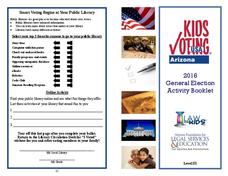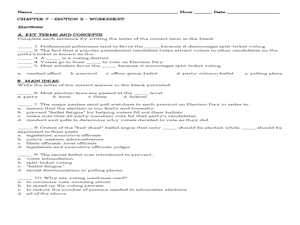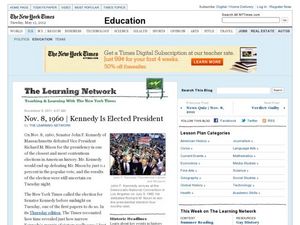Curated OER
Voters, Ballots, and Elections: Matching
After studying voting and elections in the United States, have your class show what they know. They match 15 terms related to voting, ballots, and elections to the proper definition. This is a great way to practice vocabulary or content...
Curated OER
March 2, 1877: Hayes Declared Winner in Disputed Presidential Election
After reading an interesting article comparing the disputed presidential election of 1877 to a similar event in the year 2000, kids blog a response. They read the article, check out the embedded links, then respond to four related...
Classroom Law Project
What does the Constitution say about voting? Constitutional Amendments and the Electoral College
As part of a study of voting rights in the US, class members examine Constitutional amendments connected with voting and the role of the Electoral College in the election process.
Classroom Law Project
What do cartoonists see in this election?
Cartoons from the 2008 Presidential election provide the text for a lesson designed to help learners understand how political cartoonists use persuasive techniques to present a point of view.
Mikva Challenge
Why Vote?
Elections are supposed to represent the will of the people. So why don't 100% of registered voters line up at the polls on Election Day? High schoolers study the last few elections and the voter turnout for each, according to race,...
Middle Tennessee State University
Fights, Freedom, and Fraud: Voting Rights in the Reconstruction Era
As part of a study of post Civil War era, young historians investigate the changes in voting rights during the Reconstruction Era (1863-1876), the fraud involved in the Hayes-Tilden presidential election of 1876, and efforts by Pap...
Classroom Law Project
What is a class hearing and youth summit and what do they have to do with the presidential election?
After researching the presidential election process, class members develop questions and interview voters about their choice of candidate and the issues that concern them.
Deliberating in a Democracy
Voting
Young scholars read about voting rights and compulsory voting in democracies. For this voting rights lesson plan, young scholars analyze the reasons for supporting and opposing compulsory voting and discuss whether compulsory voting is...
Read Works
The What and Who of Elections
As citizens living in the United States, it is our civil duty to vote. But how does the voting process work? After reading a five-paragraph passage on the basics of elections and voting, young constituents respond to 10 questions...
Constitutional Rights Foundation
Suppressing the Vote
Voting rights have expanded over time, but some voters are still being suppressed. A thought-provoking resource explores the history of voter suppression in the US and efforts to remove roadblocks to voting. Young historians learn about...
Classroom Law Project
What are some of today’s voting issues? Voting in Oregon, youth vote, and technology
The youth vote. Rock the Vote. Vote-By-Mail. Electronic voting. Class members investigate issues facing today's voters, and the ways they have adapted over the years to optimize voter turnout.
Law for Kids
General Election Activity Booklet
It's never too early to practice smart voting! Gain practice voting in a general election using a booklet compiled of an assortment of activities including a word search, maze, graphing, and more!
Close Up Foundation
Teach the Vote
Why is voting important? A social studies unit presents a non-partisan approach to the importance of voting, to voting laws and procedures, and to resources that voters need to become informed voters.
Constitutional Rights Foundation
The Troubled Elections of 1796 and 1800
Congress does more than create new laws. Political scientists delve into the elections of 1796 and 1800 to understand how political parties, the Electoral College, and personal agendas affected the election process. The resource also...
Curated OER
Elections: Ch 7
Identify the main idea, key terms, and concepts with this worksheet on US Elections. There are 5 fill in the blank and 5 multiple choice questions for your class to answer.
Curated OER
Election Vocabulary Quiz
For this elections worksheet, learners complete a ten question multiple choice quiz pertaining to elections in the United States.
Constitutional Rights Foundation
Elections, Money, and the First Amendment
Those who spend the most, win. Academics read informational text, participate in group discussion, and defend campaign reforms to understand the correlation between money, the First Amendment, and election results. The resource...
iCivics
Students Power Elections
A Students Power Elections resource guide provides would-be voters with the guidance they need to become voters. Included in the packet is information about voter registration and voting, how to research candidates and ballot measures,...
Curated OER
The Election Process
In this election process worksheet, students learn about the election process in the United States in which the president is selected. They then answer the 16 questions on the worksheet. The answers are on the last page.
Curated OER
Election Day
In this Election Day worksheet, students read a short story about a girl who runs for president of her class. Students answer 5 questions about the story.
Curated OER
Vote
For this following directions worksheet , students follow a series of specific instructions when coloring a large bubble letter word, "VOTE". This sheet is to encourage voting in U.S. elections.
Curated OER
Presidential Election Word Search
For this word search worksheet, students study the terms related to a presidential election. Students locate the 16 words within the word search puzzle.
Curated OER
The Presidential Election
In this Election Day instructional activity, students shade in states on a map which were won by each candidate. Each candidate is designated a specific identifying color. Students complete the electoral map.
Curated OER
Nov. 8, 1960 | Kennedy Is Elected President
Using the presidential election of 1960 as background information, learners consider the push of electoral reform. They read about the events and issues surrounding President Kennedy's win in 1960 and compare them to the same issues...























